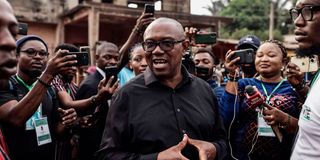Africa Kills Her Sun: Hopes of youth dashed in Nigeria

Nigeria's Labour Party presidential candidate Peter Obi talks to journalists on February 25, 2023. Obi, who lost to the ruling party APC's Bola Tinubu, said on March 2, 2023 he would challenge the result in court.
It’s always painful looking into Nigeria, Africa’s most populous state, for it requires a tremendous effort not to knock it down... From the moment you land in Lagos—the hot... noisy, merciless, human- and traffic-jammed commercial capital of the west African mega-nation—you’re drawn into a brooding, dangerous sense of a place where your life could be snuffed out with a single misstep.
Lagos is where the mosquitoes are so greedy they suck until they are too heavy to fly off. You wake up, slam hard on the bloated critter stuck into your epidermis—and watch a pint of your blood splash onto the hotel linen.
Lagos, or the embodiment of Nigeria, is a place where fiction, whatever its intensity and outlandishness, can’t keep pace with reality,” so aptly wrote Osei G. Kofi in his book, Hello Africa, Tell Me, How are You Doing?
I thought of these words as Nigerians awoke on March 1, 2023 to the news that the 70-year-old Lagos “godfather” Bola Tinubu had won the Nigerian presidential election.
Mr Tinubu beat two other major contestants in the race—the runners-up Atiku Abubakar and Peter Obi who finished third (Mr Abubakar and Mr Obi rejected the election results, citing irregularities).
The youth and other Nigerians looking for change had pinned their hopes on Mr Obi, but those aspirations have now been dashed.
Nigeria is indisputably an African juggernaut but it’s also a giant with a shambling gait. Looking into Nigeria is like looking downward from a cliff, to feel the vertigo of the depths, the blackness of inferno.
In the 2023 presidential elections, there were media reports of Nigerian voters in Lagos running in panic as gunmen fired shots in the air and stole ballot boxes.
Terrifying moments
Nigeria has those terrifying moments that one reads about in books, when a character reacts in an unexpectedly extreme way, way too extreme, like a patient with schizophrenia. Over the years, there have been chilling reports. Armed herdsmen slaughtering seemingly random people under a hail of gunfire. Waves of kidnappings. On May 19, 2021, gunmen broke into a court in Bauren Zakat village, Katsina State and kidnapped a judge!
The 2023 presidential elections were an obvious attempt to improve Nigerian life. But trying any improvements on the Nigerian Project (like in many African countries) seems futile, and sad, especially sad, like tears on a mother’s face.
In his book, The Trouble with Nigeria, Chinua Achebe delivered a sharp rebuke, “Nigerians are what they are only because their leaders are not what they should be... Look at our collapsing public utilities, our inefficient and wasteful parastatals and state-owned companies... If you want electricity, you buy your own generator; if you want water, you sink your own borehole...” This can apply to Kenya.
The public sector (from education, especially the CBC Grade 7 implementation, to the state of public healthcare) is a shame.
One of the most searing condemnations on Nigeria was delivered by Ken Saro-Wiwa, the Nigerian writer who was hanged in 1995 by the military dictatorship of General Sani Abacha. Saro-Wiwa, like Achebe, decried the sad situation in Nigeria and must have been baffled by the fact that a country with so much potential, achieved very little. In his short story, Africa Kills Her Sun, Saro-Wiwa tells a moving narrative in which the narrator (mirroring his life) writes a letter to his beloved before he is executed. He wonders why Africa doesn’t give opportunities to her best and brightest children. The youth who supported Mr Obi probably feel that their dream or “sun” has been killed.
Saro-Wiwa writes, just before he is killed by General Abacha’s men, “I recall, many years ago as a young child, reading in a newspaper of an African leader who stood on the grave of a dead lieutenant and through his tears said: ‘Africa kills her sons.’ I don’t know what he meant by that, and though I’ve thought about it long enough, I’ve not been able to unravel the full mystery of those words.
Now, today, this moment, they come flooding back to me. And I want to borrow from him. I’d like you to put this on my gravestone as an epitaph: ‘Africa Kills Her Sun.’ A good epitaph, eh? … I’m sure you’ll agree with me. ‘Africa Kills Her Sun!’
That’s why she’d been described as the Dark Continent? Yes? So, now…I’m done. My heart is light as the daylight seeps stealthily into our dark cell. I hear the prison guard jangle his keys and put them into the keyhole. Soon he’ll turn it and call us out. Our time is up. My time expires and I must send you all my love. Goodbye”.
If Nigerians, Kenyans and other Africans want a better future, they must stop “killing their suns”. We should choose leaders because they are competent, not because they have bribed us, or because they belong to our tribe. We are a continent beaming with potential.
Let’s give our best a chance to deliver the future we have always desired. We should now cross over to the other side of a land flowing with milk and honey. As Mr Tinubu leads Nigeria, we hope he proves the naysayers wrong by delivering development and prosperity to his people.





